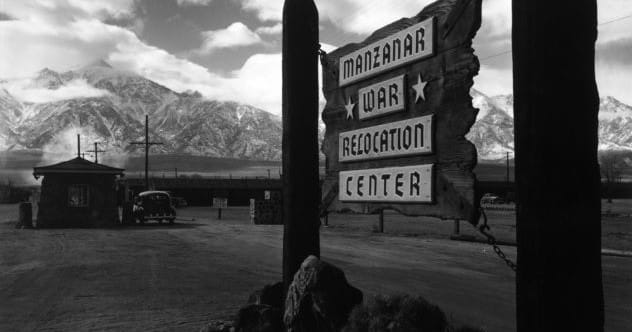Throughout its history, the United States government has sometimes taken actions that harmed different groups of people. These actions were often done with the idea of helping the country or following policies that seemed right at the time. The U.S. has made formal apologies for some of these actions. However, these apologies often come a long time after the harm was done, and they don’t always fix the problems completely. Some people think these apologies are just symbolic and not enough because they don’t always lead to real changes.
Even though these apologies might not fully make up for the past, they show that the government recognizes the wrongs that were done and takes some responsibility. Here are ten important times when the U.S. government formally apologized for things it did in the past. Each apology shows a moment when the country faced up to actions that deeply affected certain groups of people.
The Japanese American Internment Apology (1988)
After Japan attacked Pearl Harbor in 1941, President Franklin D. Roosevelt ordered over 120,000 Japanese Americans to be moved to internment camps. Families had very little time to pack and had to leave behind their homes, businesses, and other important things. Many families lost everything and suffered greatly. In 1988, President Ronald Reagan formally apologized by signing the Civil Liberties Act. He admitted that the internment was caused by “racial prejudice, wartime hysteria, and a failure of political leadership.”
The Civil Liberties Act gave $20,000 to each surviving person who had been interned. This was meant to help make up for what they had lost. Reagan’s apology was very important because it was one of the first times the government admitted it had violated people’s rights because of their race. The internment apology reminds us how dangerous it can be to discriminate against people based on their race and how important it is for the government to protect everyone’s rights, especially during difficult times.
Tuskegee Syphilis Study Apology (1997)
The Tuskegee Syphilis Study was a very unethical medical experiment that took place in the U.S. The U.S. Public Health Service conducted the study from 1932 to 1972. Over 600 African American men in Tuskegee, Alabama, were told they would get free treatment for syphilis. But in reality, they were not given the treatment so that researchers could study the disease. For 40 years, these men suffered from serious symptoms, and many of them died because of it. In 1997, President Bill Clinton formally apologized, calling the study a terrible violation of human rights.
Clinton promised to improve health care for minorities and protect people from being exploited in medical studies. He said the government would never let something like this happen again. The Tuskegee apology led to more careful examination of ethical standards in research. Rules were put in place to protect vulnerable people. This apology is a strong reminder of the need to be ethical and to respect people’s rights in medical research.
The Apology for Slavery (2008)
In 2008, the U.S. House of Representatives formally apologized for the injustices of slavery and the segregation that followed. The resolution recognized the suffering and long-term trauma caused to African Americans over many years. This was the first time the federal government officially apologized for slavery, which had been ended in the U.S. in 1865 after the Civil War. Although the apology did not include payments to make up for the harm, it was a symbolic way of acknowledging the lasting effects of slavery on African American communities.
The apology led to discussions about how to address the effects of slavery in today’s America. Some states also issued their own apologies. Activists saw it as a necessary first step toward making amends for the past. While some people criticized the apology for not including real action, it remains an important recognition of one of the worst moral failures in American history.
Native American Land Seizure Apology (2009)
In 2009, the U.S. Congress apologized to Native American tribes for the violence, land seizure, and forced relocation they had suffered for centuries. The apology recognized the harm caused by the government’s policies. It was included in a defense bill signed by President Obama. The apology expressed regret for the broken treaties and mistreatment of Native communities. This was an important moment because it acknowledged the pain and losses experienced by Indigenous people due to the government’s actions over many years.
The apology did not include direct payments to make up for the harm, but it called for greater respect for Native American rights. Native communities saw the apology as something that was long overdue because the U.S. government’s actions had greatly affected their cultures, economies, and land. Some critics felt that it did not lead to enough action, especially in returning land. However, it was an important step toward recognizing past injustices and working toward reconciliation.
“Don’t Ask, Don’t Tell” Repeal and Apology (2010)
The “Don’t Ask, Don’t Tell” (DADT) policy, which started in 1993, said that gay, lesbian, and bisexual people could not openly serve in the U.S. military. More than 13,000 service members were discharged because of DADT. These individuals faced stigma and lost career opportunities. In 2010, Congress repealed DADT, and President Barack Obama apologized. He recognized the harm the policy had caused to LGBTQ+ service members who had to serve in silence. The repeal allowed LGBTQ+ individuals to serve openly without fear of being discharged because of their sexual orientation.
Obama said that everyone should be treated equally in the military and that discrimination has no place in the armed forces. The repeal was seen as a big step forward for LGBTQ+ rights. Other changes were made to undo the negative effects of DADT. This apology is an important moment in the U.S. military’s progress toward being more inclusive for all service members.
Sterilization of Native American Women (1970s) Apology
In the 1970s, it was revealed that the Indian Health Service (IHS) had forcibly sterilized thousands of Native American women without their permission. These sterilizations were done under the idea of “population control.” These actions took away women’s reproductive rights and hurt Native communities. While the U.S. Congress did not formally apologize, the Department of Health and Human Services (HHS) later recognized that these practices were unethical. The department promised to enforce stricter rules about getting informed consent for medical procedures.
This recognition was an important moment in acknowledging the medical abuses that Native communities had suffered. It also led to new conversations about reproductive rights. The government’s acknowledgment of these sterilizations helped to highlight similar abuses in other marginalized communities. It emphasized the importance of informed consent and patient choice in health care. While some people are still pushing for a more formal apology, the HHS acknowledgment was a step toward taking responsibility and respecting Native American rights.
The Apology for the Treatment of Native Hawaiians (1993)
In 1993, on the 100th anniversary of the overthrow of Hawaii, President Bill Clinton signed the Apology Resolution. This resolution formally acknowledged that the U.S. government had helped overthrow the Hawaiian monarchy in 1893. The last queen of the Hawaiian Kingdom, Lili’uokalani, was removed from power with the help of U.S. forces, which eventually led to Hawaii being annexed in 1898. The resolution admitted that the actions toward the Hawaiian people had been unjust. Their sovereignty had been taken away, and their culture had been suppressed.
The Apology Resolution was an important step toward repairing the relationship with Native Hawaiians. It recognized the consequences of the forced annexation. While it did not include payments or the return of land, it inspired new interest in Hawaiian sovereignty and preserving Hawaiian culture. The resolution remains a controversial but important acknowledgment of America’s colonial past in Hawaii. It symbolizes an official recognition of the Hawaiian people’s right to self-government.
Apology for the Guatemalan Syphilis Experiments (2010)
Between 1946 and 1948, U.S. Public Health Service researchers conducted experiments on Guatemalan prisoners, soldiers, and psychiatric patients without their permission. The researchers infected over a thousand Guatemalans with syphilis and gonorrhea to test how well penicillin worked against these diseases. This terrible action was kept secret until 2010, when the U.S. government formally apologized to Guatemala. Secretary of State Hillary Clinton and Health Secretary Kathleen Sebelius said the experiments were unethical and inhumane.
The apology included a promise to follow ethical research standards and protect human rights in global health projects. The Guatemalan syphilis experiments are seen as one of the worst examples of American medical experimentation. This apology emphasized how important it is to get informed consent. The apology also helped to improve the relationship between the U.S. and Guatemala. It reminded the world that transparency and respect are necessary in medical research.
WWII Apology for Mistreatment of Italian and German Americans (2000)
During World War II, Italian and German Americans faced discrimination, curfews, forced relocations, and internment because of their heritage, similar to Japanese Americans. Although the Japanese internment is more well-known, this prejudice affected many Italian and German Americans who lost their homes, businesses, and social status. In 2000, the U.S. Congress apologized. It recognized that wartime fears had led to unfair treatment based on ethnicity.
The apology aimed to provide some closure for those affected. It emphasized how important it is to protect civil liberties during times when national security is a concern. The acknowledgment was an important step in addressing parts of American wartime policy that had been overlooked. It reminded people that fear-driven policies can harm different groups of people. This apology has helped to raise awareness of how policies driven by fear can affect various communities. It has sparked conversations about protecting civil rights during crises.
The Apology for the Native American Boarding School Policy (2024)
In 2024, President Joe Biden formally apologized for the federal government’s role in operating boarding schools that forcibly assimilated Native American children into American culture. These schools, which operated from 1819 to 1969, forcibly removed at least 18,000 children from their families. These children were subjected to cultural erasure and abuse. Biden’s apology followed a detailed report on the abuses, led by Secretary of the Interior Deb Haaland, the first Native American to hold a Cabinet position.
The investigation showed the extent of the abuse, including forced labor, physical and sexual abuse, and cultural erasure. The report revealed that at least 973 children died at these schools, and many were buried in unmarked graves. Biden called this policy “one of the most horrific chapters in American history.” He acknowledged the harm done to generations of Indigenous people.
At an emotional speech in Laveen, Arizona, Biden spoke at Gila Crossing Community School. This marked the first presidential visit to tribal lands in over a decade. He called for a moment of silence to remember those who suffered, saying that “no apology can or will make up for what was lost.” Biden’s speech honored the strength of Native American communities. It also highlighted his administration’s commitment to addressing this tragic past. This formal acknowledgment marked a new chapter in the federal government’s relationship with Indigenous communities. It aims to promote healing and respect for cultural heritage in the future.
What are your thoughts on these apologies? Leave your comment below!










